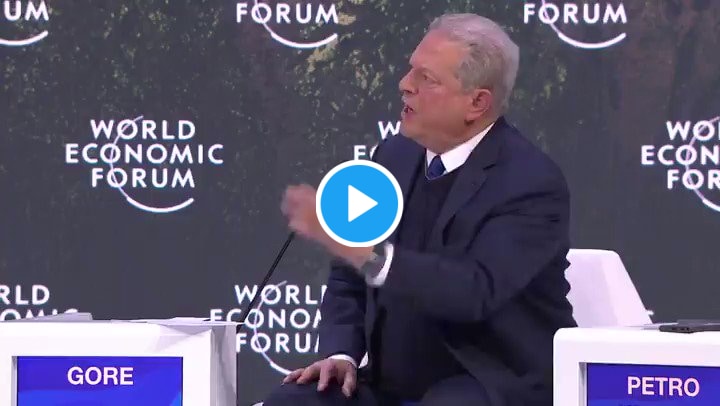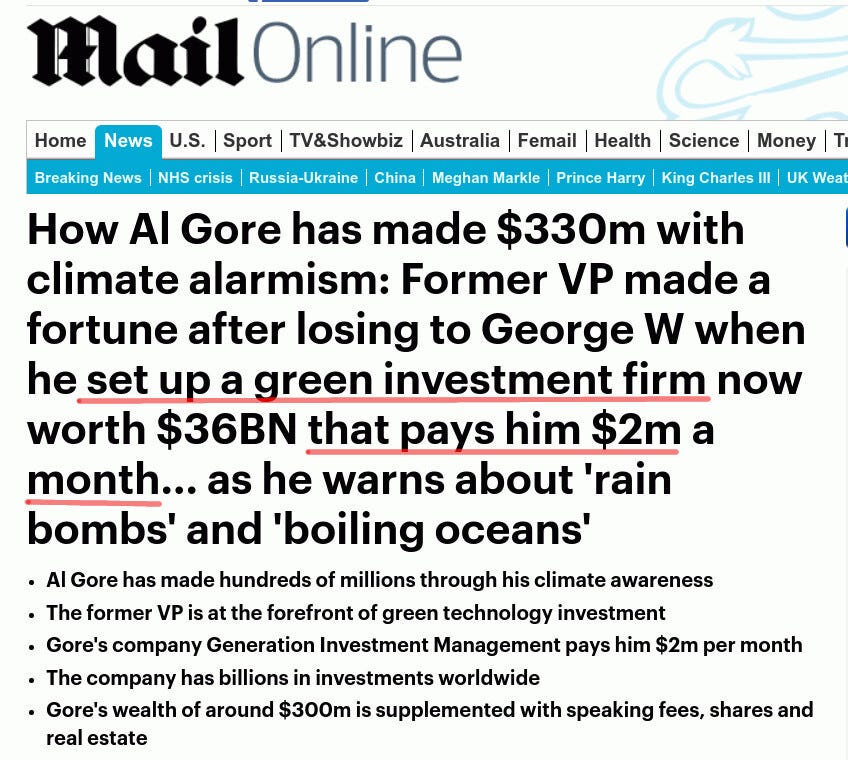Are Substackers Any Better than Al Gore? Exploring this question
Al Gore, the former Vice President of the US, has become a prominent climate change campaigner. He is always at the forefront of efforts to warn us about the dangers of global warming. Check out his latest hysterical rant at the WEF’s annual gathering in Davos. He warns us about boiling oceans and other scary consequences of climate change.

In 2009, Al Gore famously predicted that the Arctic would disappear in five years.
Al also did surprisingly well for himself, according to this DailyMail article.
The article is very interesting and well-sourced.
At the time that he ran for the presidency [in year 2000], after serving as Bill Clinton's loyal sub-ordinate for eight years, his net worth was a paltry $1.7 million, mainly through his family's land holdings in Tennessee.
the former VP has been at the forefront of green technology investment that has seen his wealth balloon to an estimated $330 million.
Gore also nets at least $200,000 per public speaking engagement. Gore's advice on 'going green' is also sought by the biggest businesses in the world for undisclosed sums.
Why would a typical company pay Al Gore for “speaking engagements”? It is difficult to imagine that listening to a man whose climate predictions consistently were disproven over time would generate business advice that would increase a corporation’s bottom line.
How can we explain Al Gore receiving $200,000 per engagement?
There is a reason why companies give money to a man whipping climate fear and creating climate anxiety leading to a mental health pandemic. The reason is that large businesses are blackmailed by various “coalitions,” committees, and alliances. A business that refuses to pay money in support of fashionable causes, or allows free speech, like Twitter, is targeted for bad press, harassment, and boycotts:
Al Gore is also financially propped by Apple and Google, far more than any possible business value he could bring to them as an individual adviser:
At the time he signed on [sic] an advisor at Google in 2001, Gore was given stock options that were worth more than $30 million.
Gore has been a member of Apple's board since 2003, and over that time, he has amassed more than 100,000 in shares and restricted stock in the company.
So when you see Al Gore advocating for his favorite causes, be aware that his advocacy worked out very well for him financially.
It is just a coincidence, right?
How Are Paid Substackers Different?
Al Gore made plenty of money peddling alarmism in various forums, via movies, newspaper interviews, etc.
I made much less money writing occasionally alarmist articles on Substack and having some paid subscribers among tens of thousands of total subscribers.
[I am thankful to the paying subscribers immensely. They get no specific benefit from supporting me and do so only because of the goodness of their hearts.]
That said, I ask myself: am I a grifter? Do I monetize (well-founded, in my opinion) fear? Are my publicly expressed concerns about declining birth rates, increased mortality, and the reckless use of billions of people as lab rats on the same moral plane as profiting from fake climate predictions? What if Al Gore also believes in his mission?
Can we say that Mr. A, making $XX.XX, from his substack, is a good guy, whereas Mr. B, making $XXXXXXXXX from his WEF-connected clients, is a bad guy? Where is the difference exactly?
My answer is that I cannot know this for sure; being a writer with paid subscribers colors my perceptions. We all invent self-serving explanations. My economics professor always said that people follow intentions.
Accusations from disinformation fighters are flying about “antivax disinformation grifters.” How can we know if someone is or is not a grifter? What does this word even mean?
These are complicated questions best left for another post. I know these questions are important when looking at anyone who publishes and receives income from publishing.
All I can do is write the best articles I can that would be true to the best of my knowledge. I also do not have corporate sponsors. Substack is something I do on the side, apart from my main job.
Additionally, I decided a while ago that I did not want to be a peddler of doom. So even though I describe bad things as they are happening, I also try to seek out good news and report on them.
Thanks for listening. Let us know what you think.
You're currently a free subscriber to Igor’s Newsletter. For the full experience, upgrade your subscription.



